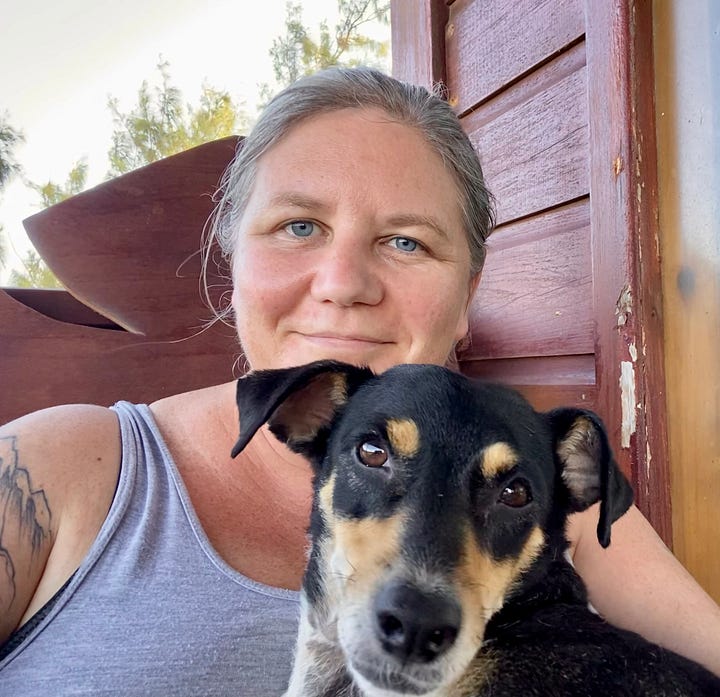Vetting Housesits: Stay Safe While Finding Opportunities to Live Like a Local
Before you pack your bags for that dream housesit, let’s make sure it’s the perfect adventure waiting for you—and not a surprise plot twist.
Housesitting is an incredible, affordable way to immerse yourself in new environments and live like a local. Imagine waking up in a cozy cottage nestled in the English countryside, enjoying a morning coffee on a sun-drenched terrace in Spain, or listening to the waves of the Caribbean Sea splash up on shore beneath you.
From urban apartments to rural retreats, housesitting allows you to experience diverse places that might otherwise be out of reach. But it's not just about the places. You get to care for someone's home and pets, which gives your stay a deeper purpose and makes you an integral part of the community, not just a visitor.
However, as thrilling as it is to explore new destinations, staying in someone else’s home—especially in another country—requires careful thought, planning, and vetting potential sits. The dream of living like a local can quickly turn into a challenging situation if it’s not the right fit to begin with.
That’s why vetting potential housesits is essential. Before you commit, it's crucial to ensure that the experience will be both safe and enjoyable, with responsibilities and expectations that align with your lifestyle.
Whether you're new to housesitting or a seasoned pro, properly evaluating each opportunity helps you avoid unexpected surprises and ensures you can focus on enjoying the adventure.
Let’s look at some of the key considerations and questions you’ll want to work through before you commit to that next (or your very first!) housesit.
Disclosure: Midlife Nomads often refers and links to websites, apps, and products/services I actually use. Sometimes, I receive compensation if readers sign up or make a purchase. A girl’s gotta eat – and travel!
Research the Area
Before committing to a housesit, research the local area thoroughly. Understanding your destination's culture, climate, and living conditions can make a huge difference in your experience.
Is the area known for its bustling local markets, or is it a quiet, remote village? What’s the typical weather during your stay—should you pack for warm, sunny days or prepare for rain and chilly evenings?
Recommended reading:
Get a sense of the local vibe. Beyond the basics, consider the amenities and services available in the area. Are there grocery stores, pharmacies, or medical facilities nearby? How about public transportation or Wi-Fi access?
Knowing these details helps you prepare and ensures that the location aligns with your lifestyle and needs.
Thoroughly Review Listings
Before you agree to a housesit, take the time to thoroughly review the entire listing. Every word and detail matters. Start by carefully reading the house rules—are there specific do's and don'ts you must be aware of?
Some homeowners might have particular preferences or strict guidelines about how their home is maintained, and it’s essential to know these upfront.
Next, what about the pet care requirements?
What does a typical day look like for the pets you’ll be caring for? Do they have specific feeding schedules, medication routines, or exercise needs? Understanding these details helps you assess whether you’re comfortable with the responsibilities and gives you a clearer picture of how your daily routine will look.
Don’t forget to examine the photos provided in the listing. Look for clear and comprehensive images of both the property and the pets. A well-documented listing can give you a much better sense of the environment you’ll be stepping into.
Don’t hesitate to ask the homeowner for more information if anything is unclear or missing. A detailed listing is often a sign of a thoughtful homeowner, and it can help you avoid any misunderstandings once you arrive.
Communicate with Homeowners
One of the most critical steps in vetting a housesit is arranging a video call with the homeowner. This isn’t just a chance to build rapport; it’s your opportunity to get a firsthand look at the living space and meet the pets you’ll be caring for.
I’ve only had one housesit where the owner couldn’t get on a video call, but we had a lot of mutual friends so I was reasonably certain their home was going to be a safe place for me. If you can’t get a homeowner on a video call to vet the opportunity, I would listen to what your gut is screaming at you.
Anyway, during this call, you want the homeowner to show you around the home. Seeing the spaces you’ll live in—like the kitchen, bedroom, and outdoor areas—helps ensure the environment matches your expectations and needs. Do you need a workspace? Make sure that’s available.
Recommended reading:
Meeting the pets via video is equally important. Observing their behaviour, energy levels, and how they interact with the homeowner can give you valuable insights into what daily life will be like. Use this time to ask detailed questions about their care routines, temperament, and any special needs they might have.
By the end of the call, make sure both you and the homeowner have a clear understanding of expectations, responsibilities, and any specific requirements. This way, you can confidently decide if the housesit is the right fit for you, knowing you’ve done your due diligence.
Ask the Right Questions
When vetting a potential housesit, asking the right questions is key to ensuring a smooth and enjoyable experience. Make your list of questions before your interview call (feel free to start with the list below and add to it). If the homeowner seems annoyed with a lot of questions, I’d be hesitant about the housesit. This is where you’ll be staying for weeks or months, and it needs to be the right fit.




Start with the details of the pets' care:
What is the pets' daily routine?
How often and at what times do they eat?
What type of exercise do they need, and how often?
Are there any health conditions or medications that require special attention?
Do the pets have any dietary restrictions or specific feeding instructions?
Are there any unique behaviours or quirks I should be aware of?
Next, turn your attention to the house rules. Every homeowner has their own preferences, and it's important to understand these before committing to a housesit:
What are the house rules regarding guest policies—can I have visitors, or is the home off-limits to anyone but me?
What are your expectations for cleaning and maintaining the home during my stay?
Are there specific instructions for waste disposal, laundry, or gardening?
Are there guidelines for conserving water, electricity, or heating?
Are there areas of the home that are off-limits or require special care?
Don’t forget to ask about the neighbourhood to ensure you’re prepared and comfortable with the surroundings:
How safe is the neighbourhood, especially at night?
It the area walkable? Where are the nearest grocery stores, pharmacies, and other essential services?
Are there good local cafes, restaurants, or markets nearby?
What are the transportation options—is there reliable public transit, or will I need to rent a car?
Are there any local customs, events, or activities I should be aware of during my stay?
Asking these targeted questions helps you get a better understanding of what the housesit entails so you can make an informed decision about whether it’s the right fit for you.
Clarify Financial Responsibilities
This isn't just about who pays for what—it’s about making sure the arrangement feels like a fair exchange of value. After all, housesitting is typically a mutually beneficial arrangement: you get to experience life as a local, and the homeowner gets peace of mind knowing their home and pets are in good hands.
Start by discussing who will cover the cost of utilities during your stay. If you’re expected to pay for electricity, water, or gas, it’s worth considering whether this fits into your budget, especially if the sit is longer-term. Some homeowners may include these costs as part of the arrangement, but others might not. If the financial expectations feel burdensome, it’s okay to reassess whether this sit is the right fit for you.
Pet-related expenses are another key area to clarify. Emergencies happen—if a pet needs an unexpected trip to the vet, who’s responsible for the bill? If the homeowner doesn’t have a clear plan for these situations, or if they expect you to cover these costs upfront without a guarantee of reimbursement, it’s worth thinking twice before committing.
Another crucial factor to consider is the level of responsibility required. If the housesit involves caring for multiple pets, high-need animals, or even farm animals, this could quickly become a part-to-full-time job.
Similarly, if the home requires significant upkeep—like garden maintenance, pool care, or dealing with frequent repairs—you need to ask yourself if this is truly a fair exchange for what you’re getting in return. If the responsibilities start to feel more like a burden than a benefit, it might not be the right sit for you.
At the end of the day, the goal is to find a housesit that feels balanced and mutually beneficial. If the financial or maintenance expectations are too high, or if the arrangement doesn’t seem fair, it’s perfectly okay to walk away. Trust your instincts and make sure the housesit aligns with your expectations and needs before making a commitment.
Check References and Reviews
Checking references and reviews is a crucial step in the vetting process. Reviews from previous sitters can offer valuable insight into the homeowner’s reliability, communication style, and the accuracy of their listing.
Pay close attention to comments about the condition of the home, the behaviour of pets or others in the neighbourhood, and how well the homeowner prepared them for the sit.
Recommended reading:
Positive reviews often highlight a smooth experience, while negative ones can reveal potential red flags, such as unclear instructions, unexpected issues, or unresponsive communication.
Don’t be afraid to ask the homeowner to put you in touch with a previous sitter. Speaking directly with past sitters can give you a more in-depth perspective than written reviews alone. If the homeowner is new to using housesitting platforms, they may not have reviews yet, making personal references even more important.
Here are some questions you might ask when checking homeowner references:
How was the overall experience with this homeowner? Would the sitter housesit for them again?
Was the homeowner clear about their expectations and the responsibilities involved?
Were there any surprises or issues that weren’t mentioned in the listing?
How well did the homeowner prepare the previous sitter for the sit? Were they organized and thorough?
It’s also important to provide references from your own previous housesits if the homeowner requests them. A good reference from a past sit can significantly boost your credibility and reassure the homeowner that you’re reliable and experienced. Make sure your references highlight your ability to care for pets, maintain a home, and communicate effectively.




Ask for Receipts!
It’s not rude to ask for verification of certain things. For example, if you rely on a stable internet connection for remote work, you can’t afford to take the homeowner’s word that the wifi is good. Many sitters (including this one) have encountered situations where the internet wasn’t as fast or reliable as promised, which can be a major issue if you need to stay connected.
To avoid this, ask the homeowner to perform a few internet speed tests at different times of day and send you a screenshot of the results. This simple request takes only a few seconds and ensures that the connection meets your needs before you commit.
Beyond the internet, consider verifying heating and cooling systems, pet medications, appliance functionality, and essential safety features like smoke and carbon monoxide detectors.
However, if you’re planning on housesitting internationally, keep in mind that safety standards and living conditions can vary dramatically from country to country, and even from one region to another within the same country. If working carbon monoxide detectors or certain comforts are essential to you, thoroughly research the area beforehand. Make sure you’re targeting housesits in countries and regions where people typically live up to those standards.
Recommended resource: Discover weekend trips and tours in Europe and US, plus save on Viator experiences during your housesit.
Trust Your Instincts
When it comes to housesitting, trusting your instincts is one of the most crucial pieces of advice. If something feels off during your interactions with a homeowner, or if you notice any red flags, it’s often a sign that you should pass on the opportunity.
No matter how appealing the location or how adorable the pets might seem, your comfort and safety should always come first.
I had an experience where I had already committed to a sit, but several months ahead, the homeowner gave me really negative vibes. As we exchanged more messages and I witnessed the homeowner’s behaviour on social media, it didn’t sit right with me so I decided to cancel. A year later, the homeowner was arrested for murder. 😬
That experience reinforced the importance of listening to my gut – big time.
Here are some key questions to ask yourself as you trust your instincts:
Does the homeowner’s communication style make you feel comfortable?
Are there any inconsistencies or vague details in the listing or during your conversations?
Do you feel pressured to commit quickly without enough information?
Are there specific concerns about the home, residents, pets, or neighbourhood that don’t sit right with you?
Can you join local forums or social groups that will help you get to know the community and the homeowner better before you go?
Trusting your instincts and choosing a sit that matches your needs is key to a positive and safe housesitting experience.
Get Everything in Writing
Before embarking on any housesit, you’ll want to have a written agreement in place. This document should clearly outline your duties, house rules, emergency contacts, and any other important details.
Having everything in writing not only protects both you and the homeowner but also provides a clear reference for expectations throughout your stay. It’s much easier to refer back to a written agreement if any questions or issues arise, ensuring that both parties are on the same page.
Make sure your agreement covers key aspects such as pet care routines, cleaning responsibilities, utility usage, and any other specific tasks the homeowner expects you to handle. Don’t forget to include important contact information for emergencies, whether it’s a neighbor, a local vet, or a trusted friend of the homeowner.
While this blog post covers the basics of vetting housesits, the topic of housesitting agreements deserves its own deep dive. Stay tuned for our next blog post, where we’ll explore how to craft a thorough and effective housesitting agreement that sets you up for a successful and stress-free experience.









